Upcoming:
Venue: Room 110, Morningside Building, Chinese Academy of Sciences
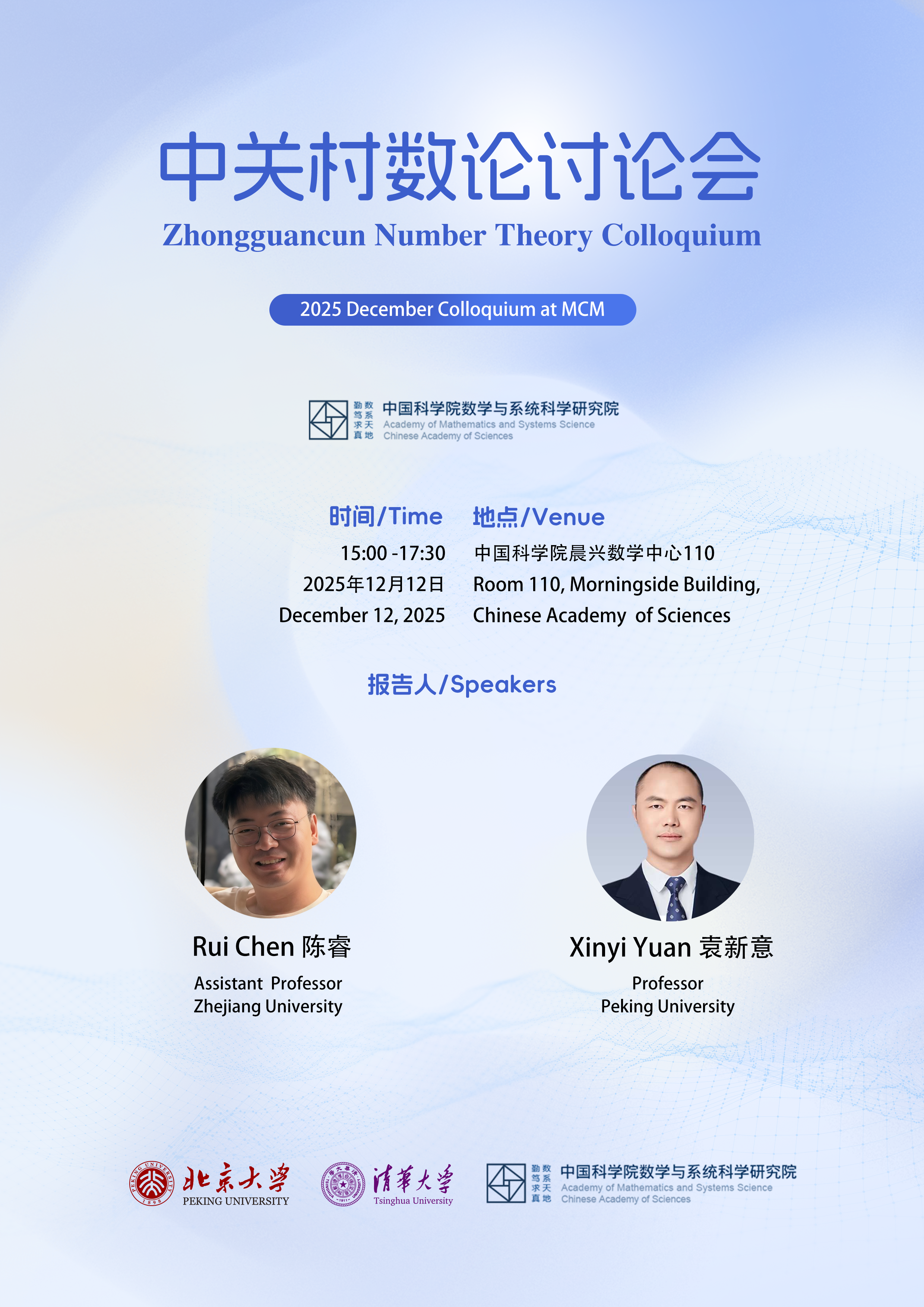
Title: Unitary dual problem for p-adic classical groups: the good parity case
Speaker: Rui Chen (Zhejiang Univ.)
Time: 15:00--16:00
Abstract: Classifying irreducible unitary representations is one of the most important problems in representation theory of reductive groups. In this talk, we will discuss the recent breakthrough on this problem by Atobe--Minguez, and generalize their results using the theta lifting.
Title: A quantitative Mordell conjecture
Speaker: Xinyi Yuan (Peking Univ.)
Time: 16:30--17:30
Abstract: The Mordell conjecture was proved by Faltings in 1983, and a uniform version of the conjecture was proved by Dimitrov-Gao-Habegger and Kuhne in 2021. In tihs talk, I will present an explicit version of the uniform conjecture. This is my joint work with Jiawei Yu (虞家伟) and Shengxuan Zhou (周胜铉).
Past:
Venue: Lecture Hall, Jiayibing Building, Jingchunyuan 82, BICMR
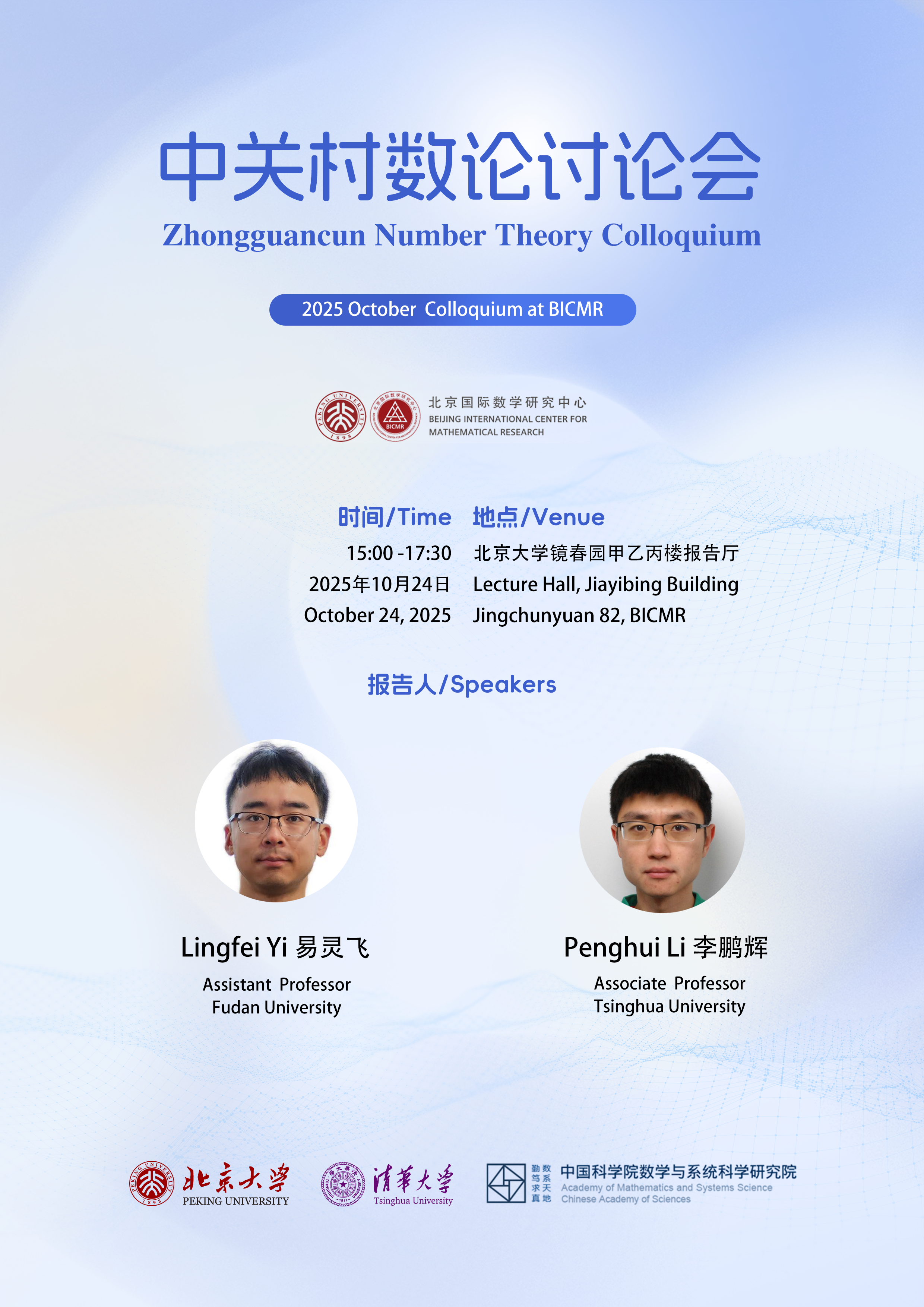
15:00-16:00
Speaker: Lingfei Yi (Fudan University)
Title: A local geometric Langlands between toral supercuspidal representations and irreducible isoclinic formal connections.
Abstract: We establish in the de Rham setting a correspondence between irreducible isoclinic formal connections with toral supercuspidal representations originally constructed by Adler. The correspondence can be formulated for more general supercuspidal representations using Yu's data. As applications, we confirm some predictions on the Langlands parameters of some supercuspidal representations with small depths in the positive characteristic.
16:30-17:30
Speaker: Penghui Li (Tsinghua University)
Title: Triangular numbers, square numbers and Langlands duality
Abstract: We study cuspidal part of the categorical trace of the affine Hecke category. Motivated by geometric Langlands for 3 manifold, we expect this cuspidal part is self dual under Langlands duality. We verify the type B, C case, which comes down to an interesting equation about triangular and square numbers. This talk is based on joint work with Dragos Fratila and Sam Gunningham.
Venue: Lecture Hall C548, Tsinghua University Shuangqing Complex Building A

15:00-16:00
Speaker: Andreas Mihatsch (Zhejiang University)
Title: Transferring intersection number identities to characteristic p
Abstract: The last few years saw proofs of several new intersection number identities such as the arithmetic fundamental lemma of Wei Zhang, or the Kudla-Rapoport Conjecture proved by Chao Li and Wei Zhang. In my talk, I will present a general technique for transporting such identities from mixed to equal characteristic which is based on close fields. Our main new objects are profinite families of moduli spaces of formal O-modules, where O interpolates between mixed and equal characteristic. Our main results state that intersection numbers in such families stabilize as one approaches characteristic p. This is joint work with Sebastian Bartling.
16:30-17:30
Speaker: Don Zagier (Max Planck Institute for Mathematics)
Title: The Habiro ring: an introduction
Abstract: The Habiro ring, which was invented by a topologist as the natural home for quantum invariants of 3-manifolds, is actually a purely number-theoretical object and also a very interesting one, but is not at all well known to number theorists. I will define this ring and explain its main properties and some different ways of looking at it from an elementary point of view, as well as giving several examples. I also hope to say something about its generalization to a ring associated to a number field, and of certain modules over this ring. The existence of these more general objects became clear from my work with Stavros Garoufalidis on quantum invariants of knots and 3-manifolds that I discussed in the Chern lectures, and the theory was then developed in a joint paper of the two of us with Peter Scholze and Campbell Wheeler, but this story is more complicated and I will only be able to touch on some highlights.
Registration: https://www.wjx.top/vm/wauMfBl.aspx#
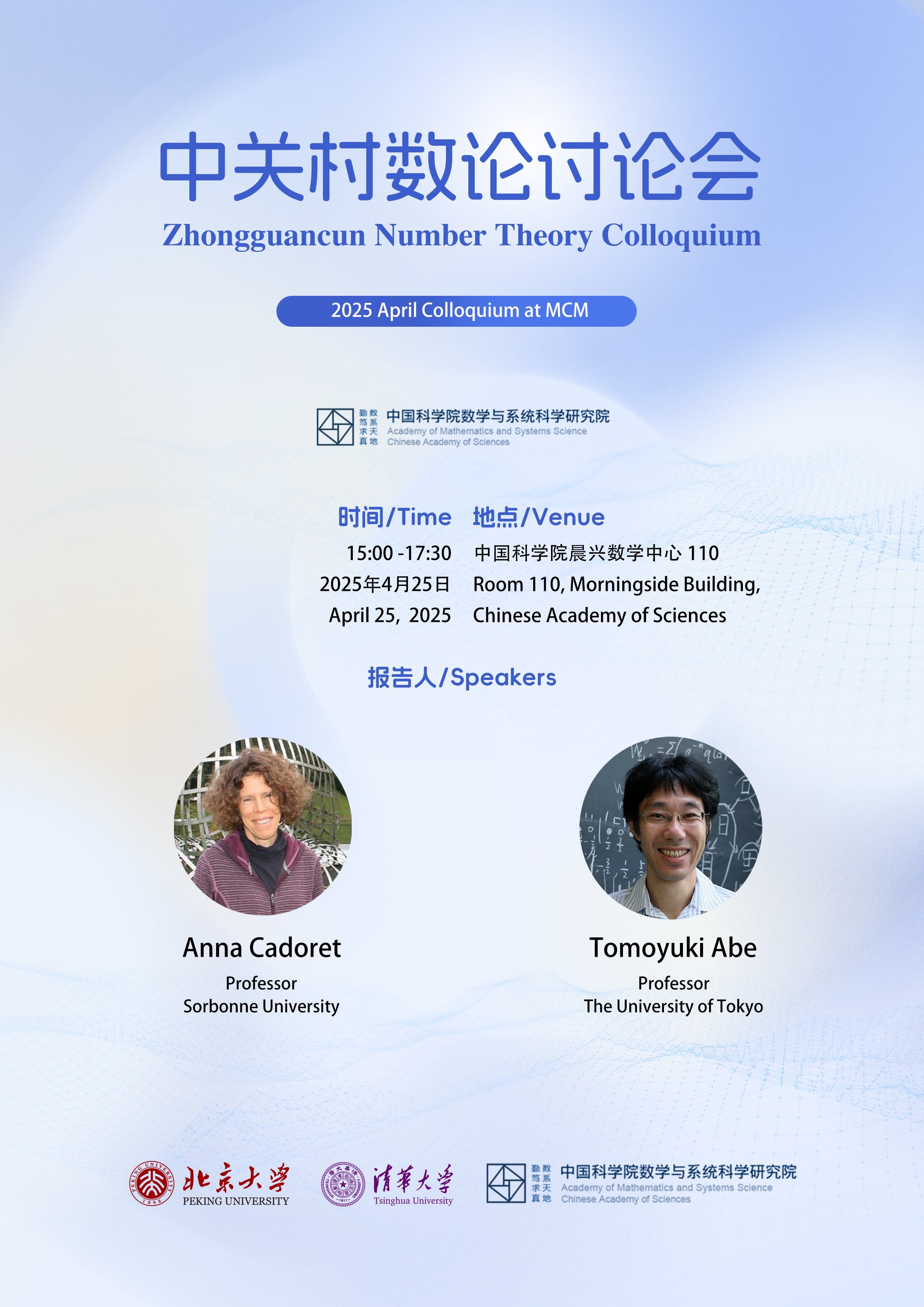
15:00-16:00
Speaker: Anna Cadoret (Sorbonne Université)
Title: Variation of Tannaka group of perverse sheaves over abelian varieties in families
Abstract: Given a relative perverse sheaf P (in the sense of Hansen-Scholze) over an abelian scheme A/S over a smooth irreducible variety S, whose restriction to the geometric generic fiber A_\eta is semisimple (in the corresponding Tannakian category), we prove that the loci of all s in S where the connected component of the derived subgroup of the Tannaka group of P restricted to A_s degenerates is not Zariski-dense. This builds on and enhances previous works by Kramer and Weissauer. Applying our result to intersection complexes, and using computations by Javanpeykar-Lehn-Kramer-Maculan, we derive geometric applications. This is a joint work with Haohao Liu.
16:00-16:30 Tea Break
16:30-17:30
Speaker: Tomoyuki Abe (The University of Tokyo)
Title: Serre's conjecture on Artin character in the geometric case
Abstract:
Given a finite group G which acts on a regular local ring A with some conditions, Serre defined an integer-valued function on G. When A is a discrete valuation ring, this coincides with the classical Artin character, and as a consequence, it is the associated character of the Artin representation. He conjectured that the same picture holds in the higher dimensional case: the function is an associated character of an l-adic representation. When A is equal characteristic, I want to show how this conjecture can be proven as a small application of Lu-Zheng's categorical trace for etale sheaves.
Venue: Lecture Hall, Jiayibing Building, Jingchunyuan 82, BICMR
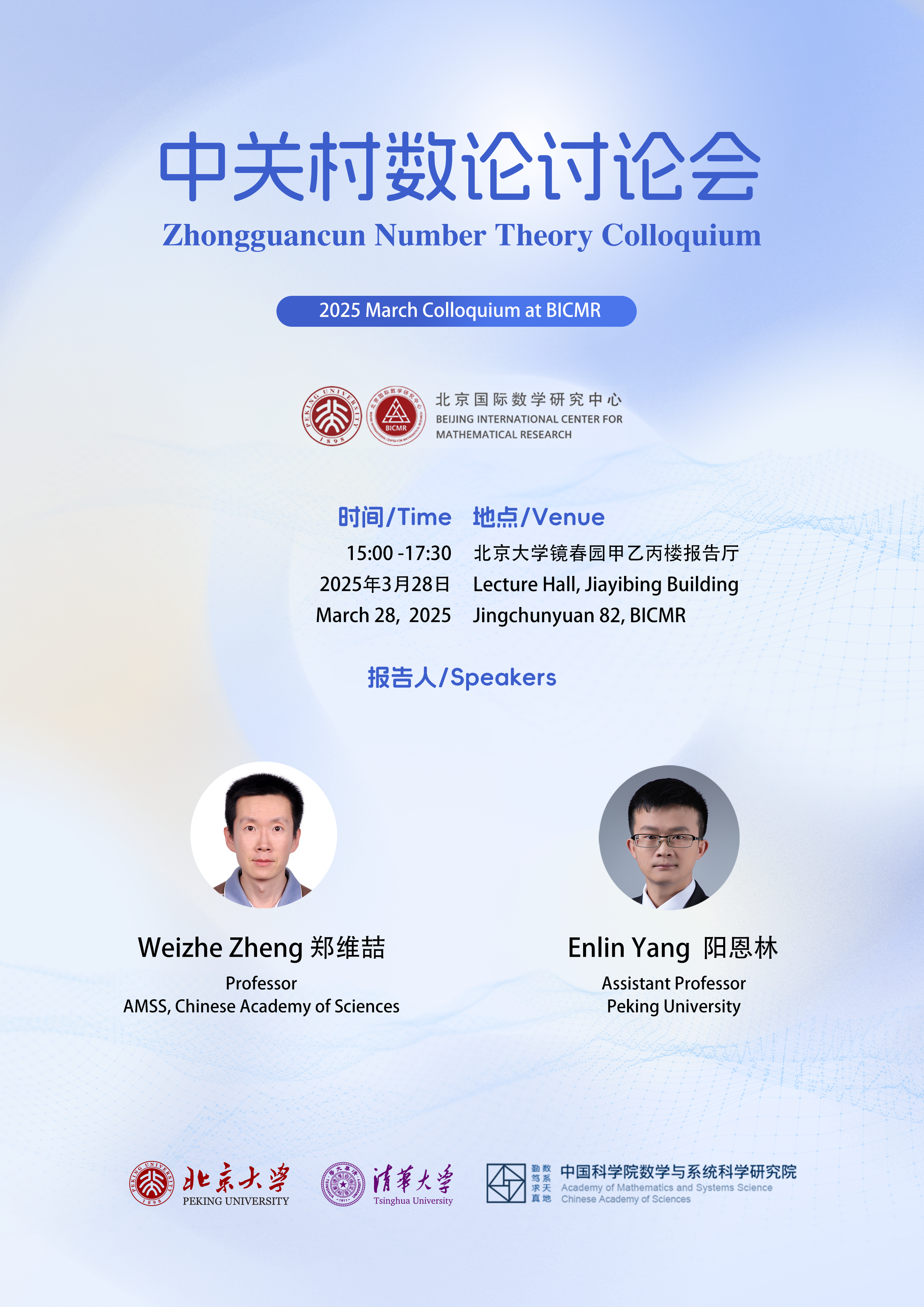
15:00-16:00
Weizhe Zheng (CAS)
Title: Arithmetic properties of l-adic cohomology over p-adic fields
Abstract: I will give an overview of arithmetic properties of l-adic cohomology of algebraic varieties and rigid spaces over p-adic fields. A special focus will be given to integrality and p-adic valuations of Frobenius eigenvalues, with applications to weights and quasi-unipotence. This talk is partly based on joint work with Qing Lu.
16:30-17:30
Enlin Yang (PKU)
Title: Saito's conjecture on characteristic classes of constructible etale sheaves
Abstract: In this talk, we sketch the construction of non-acyclicity classes for constructible etale sheaves on (not necessarily smooth) varieties, which is defined in a joint work with Yigeng Zhao. As an application, we prove the quasi-projective case of Saito's conjecture, i.e., the cohomological characteristic classes defined by Abbes and Saito can be computed in terms of the characteristic cycles.
Venue: C548, Tsinghua University Shuangqing Complex Building A

15:00-16:00
Masao Oi (NTU)
Title: Local Langlands conjecture and positive-depth Deligne-Lusztig theory
Abstract: The local Langlands conjecture predicts that irreducible representations of a p-adic reductive group can be classified in terms of certain arithmetic data involving local Galois representations. One possible approach to the local Langlands conjecture is to find some nice parametrization of irreducible representations of a p-adic reductive group because it typically enables us to construct the corresponding local Galois representations in an explicit manner.
On the other hand, by Deligne-Lusztig theory, it is known that any irreducible representation of a finite reductive group can be realized on the etale cohomology of an algebraic variety called the Deligne–Lusztig variety. Recently, Chan–Ivanov established a generalization of Deligne–Lusztig theory, which provides representations of open compact subgroups of a p-adic reductive group.
In this talk, I would like to discuss the relationship between Chan–Ivanov’s representations and a certain class of representations of a p-adic reductive group, especially, from the viewpoint of the local Langlands conjecture.
This talk is based on my joint work with Charlotte Chan (University of Michigan).
16:30-17:30
Wee Teck Gan (NUS)
Title: Global Langlands parameters for G_2
Abstract: I will discuss a joint work with Erez Lapid which gives a characterization of those automorphic representations of GL(7) which arise as the functorial lifts from globally generic cuspidal representations of the exceptional group G_2. This refines earlier results of Joseph Hundley and Baiying Liu and gives rise to a notion of global L-parameters for G_2.
Venue: Room 110, Morningside Building, Chinese Academy of Sciences
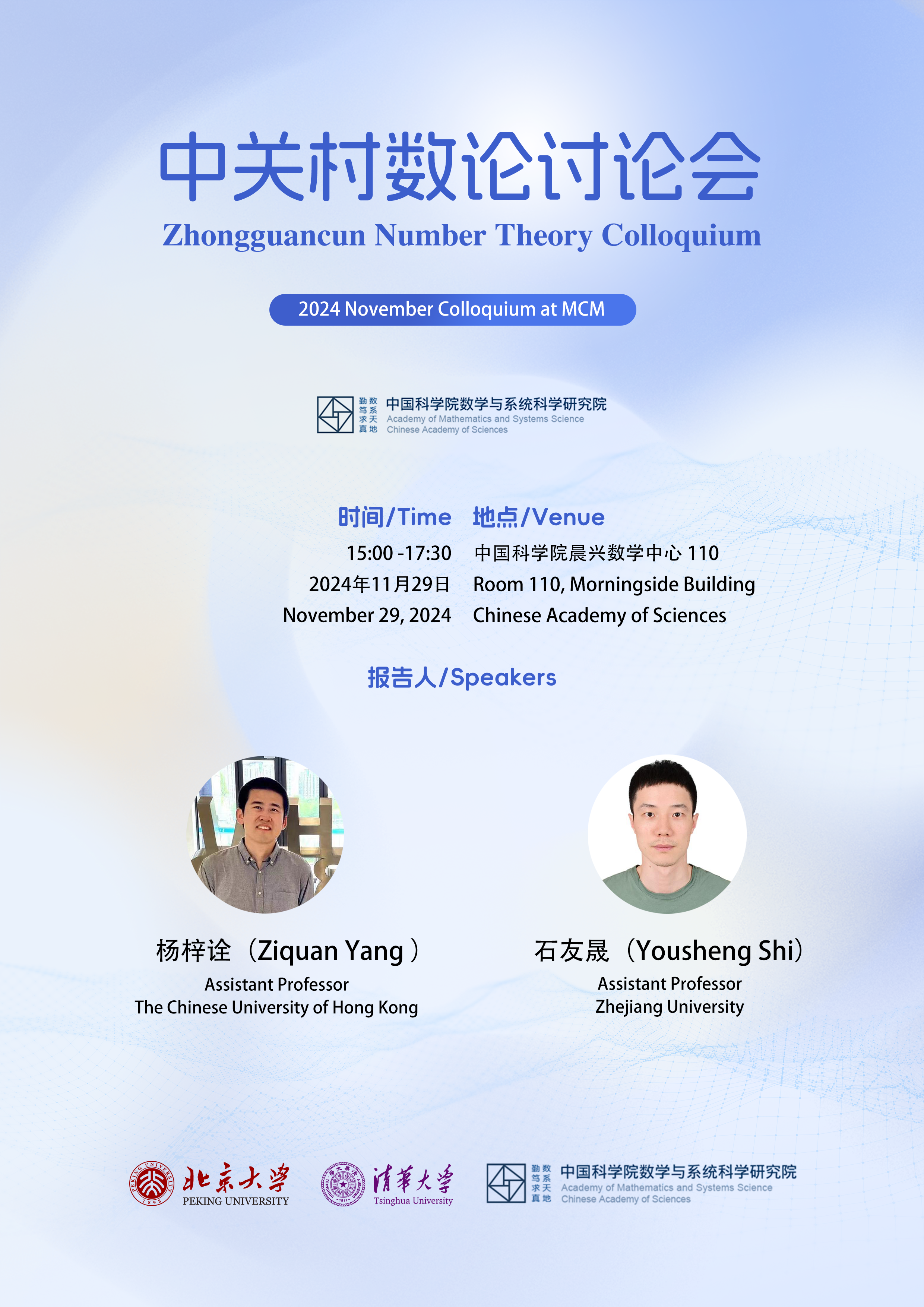
15:00-16:00, Ziquan Yang
Title: Some Arithmetic Applications of Functional Transcendence
Abstract: A classical question in number theory is whether there are algebraic relations among given transcendental numbers. In functional transcendence theory, transcendental numbers are replaced with power series. Of particular interest is the case when the power series arise from variations of Hodge structures. I plan to give a survey talk on the arithmetic applications of functional transcendence results, including one from my joint work with Urbanik last year.
16:30-17:30, Yousheng Shi
Title: The Kudla-Rapoport Conjecture: knowns and unknowns
Abstract: The Kudla-Rapoport Conjecture is a precise identity between the arithmetic intersection number of special cycles on unitary or orthogonal Shimura varieties and the central derivative of Eisenstein series. It sheds light on the relation between L-functions and algebraic cycles. In this talk, I will discuss known results about this conjecture and some open problems.
Venue: Lecture Hall, Jiayibing Building, Jingchunyuan 82, BICMR
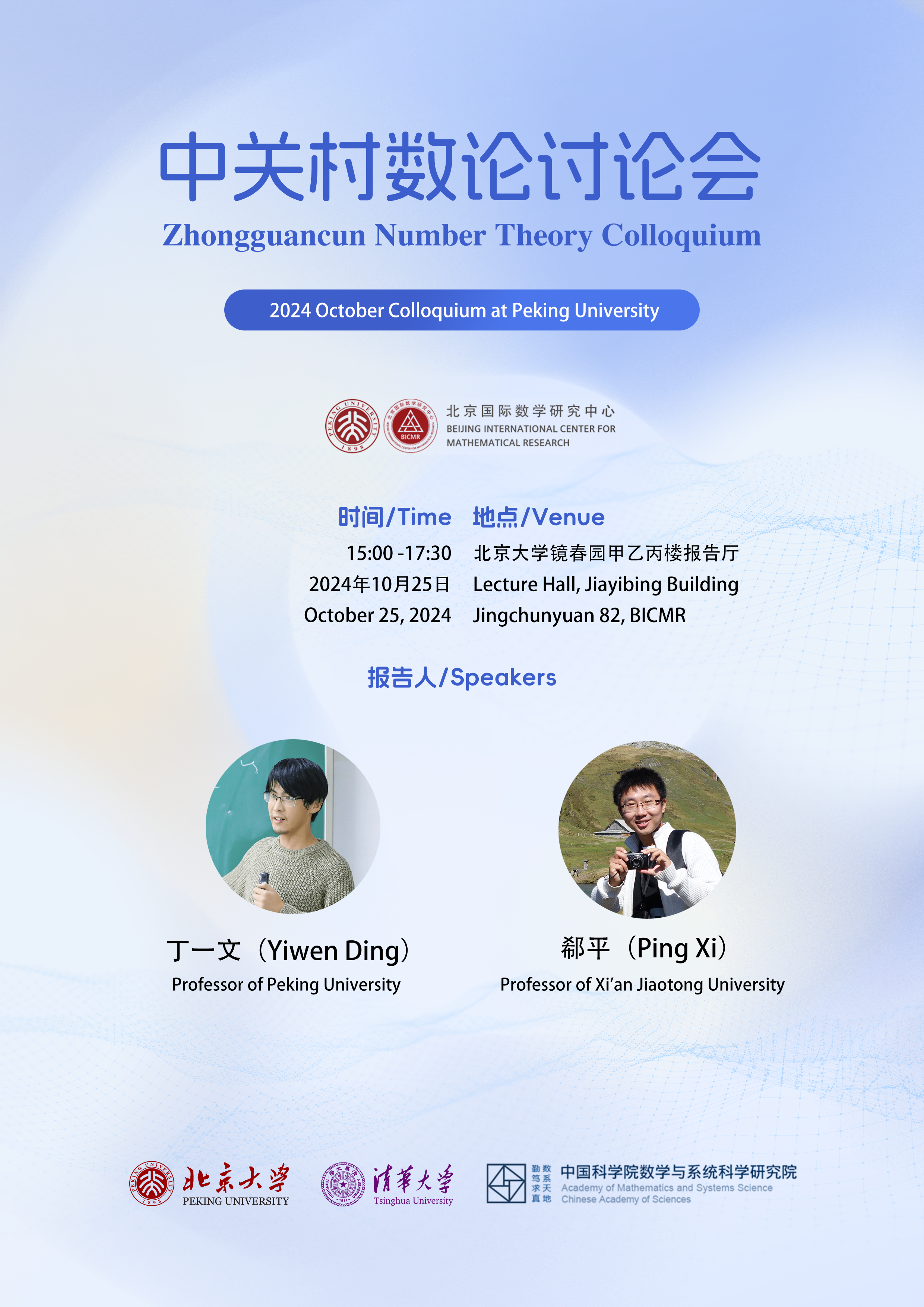
15:00-16:00 Yiwen Ding (Peking University)
Title: Hodge filtration and p-adic Langlands programme
Abstract: A basic problem in p-adic Langlands programme is to find the information of Hodge filtration in p-adic automorphic representations. In the talk, we will discuss some results, conjectures and speculations towards the problem.
16:30-17:30 Ping Xi (Xi'an Jiaotong University)
Title: Exponential/character sums in analytic number theory
Abstract: Applications of Fourier analysis to number theory create exponential and character sums. Estimates for such sums turn out to be very crucial in analytic number theory. We would like to show how the deep works of Weil, Deligne, Laumon, Katz, et al can be adapted to deal with such (incomplete) sums.
Time:Fri., 15:00-17:30, Sept. 27, 2024
Venue: Shuangqing C654 (note that the lecture room was changed)
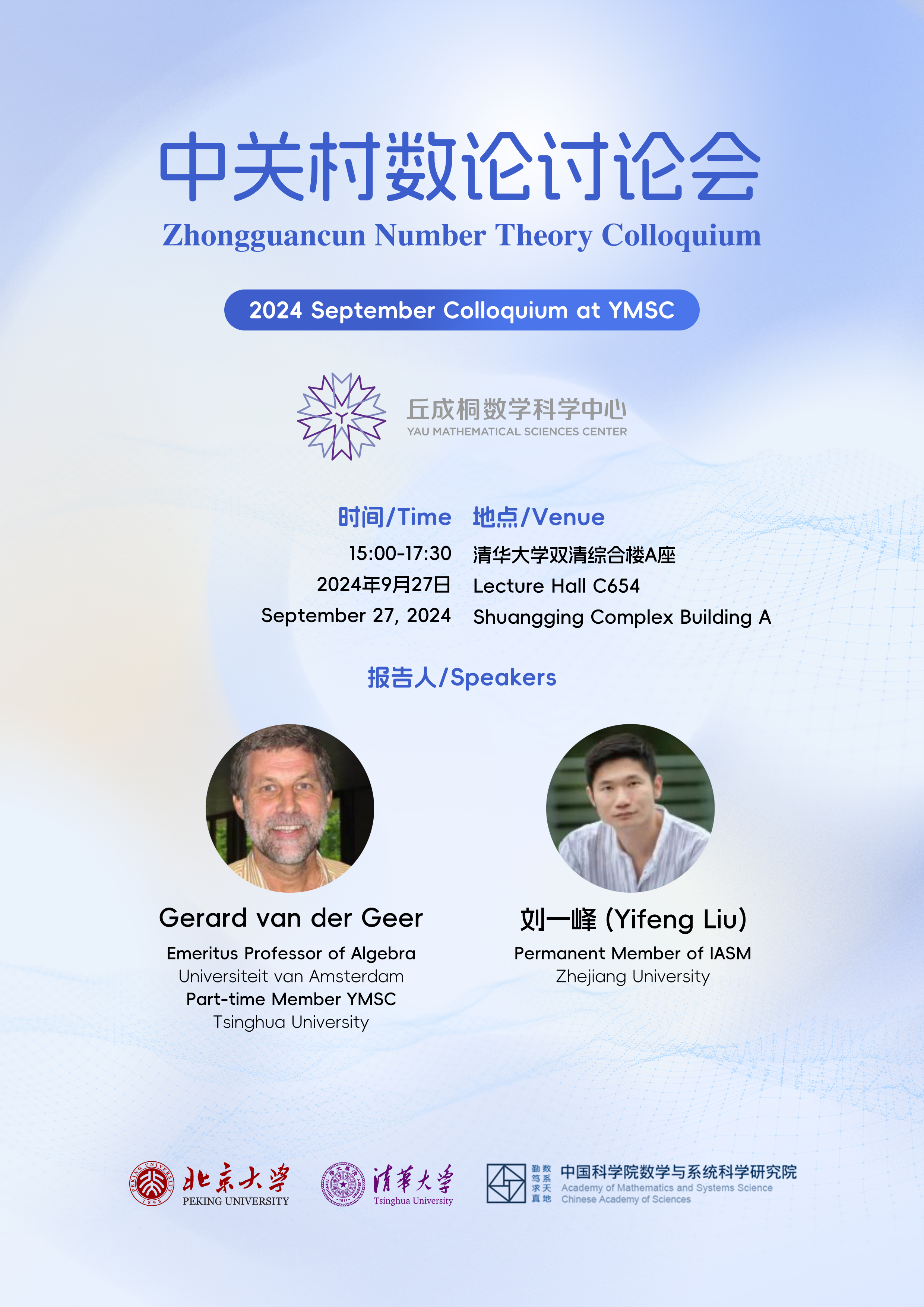
15:00-16:00, Gerard van der Geer
Title: Picard modular forms and curves of genus three
Abstract: We discuss how to calculate traces of Hecke operators on Picard modular forms by the use of point counting of curves of genus three over finite fields. This is joint work with Jonas Bergstroem and Fabien Clery.
16:30-17:30, Yifeng Liu
Title: Bessel periods and Selmer groups over ordinary eigenvariety
Abstract: We (re)construct the ordinary part of the eigenvariety for a reductive group G from the module of integral ordinary distributions. For G=U(n)xU(n+1), we construct the Bessel periods as H-invariant distributions, in both definite and indefinite cases, where H is the diagonal subgroup of G appearing in the Gan-Gross-Prasad conjecture. Finally we relate such period to the characteristic divisor of the Selmer group of the standard Galois representation over the eigenvariety.






